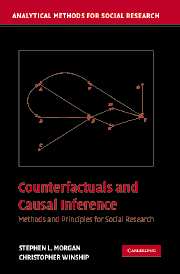Book contents
- Frontmatter
- Contents
- Acknowledgments
- Part 1 Counterfactual Causality and Empirical Research in the Social Sciences
- 1 Introduction
- 2 The Counterfactual Model
- Part 2 Estimating Causal Effects by Conditioning
- Part 3 Estimating Causal Effects When Simple Conditioning Is Ineffective
- Part 4 Conclusions
- References
- Index
1 - Introduction
Published online by Cambridge University Press: 05 June 2012
- Frontmatter
- Contents
- Acknowledgments
- Part 1 Counterfactual Causality and Empirical Research in the Social Sciences
- 1 Introduction
- 2 The Counterfactual Model
- Part 2 Estimating Causal Effects by Conditioning
- Part 3 Estimating Causal Effects When Simple Conditioning Is Ineffective
- Part 4 Conclusions
- References
- Index
Summary
Did mandatory busing programs in the 1970s increase the school achievement of disadvantaged minority youth? If so, how much of a gain was achieved? Does obtaining a college degree increase an individual's labor market earnings? If so, is this particular effect large relative to the earnings gains that could be achieved only through on-the-job training? Did the use of a butterfly ballot in some Florida counties in the 2000 presidential election cost Al Gore votes? If so, was the number of miscast votes sufficiently large to have altered the election outcome?
At their core, these types of questions are simple cause-and-effect questions of the form, Does X cause Y? If X causes Y, how large is the effect of X on Y? Is the size of this effect large relative to the effects of other causes of Y?
Simple cause-and-effect questions are the motivation for much empirical work in the social sciences, even though definitive answers to cause-and-effect questions may not always be possible to formulate given the constraints that social scientists face in collecting data. Even so, there is reason for optimism about our current and future abilities to effectively address cause-and-effect questions. In the past three decades, a counterfactual model of causality has been developed, and a unified framework for the prosecution of causal questions is now available. With this book, we aim to convince more social scientists to apply this model to the core empirical questions of the social sciences.
- Type
- Chapter
- Information
- Counterfactuals and Causal InferenceMethods and Principles for Social Research, pp. 3 - 30Publisher: Cambridge University PressPrint publication year: 2007

